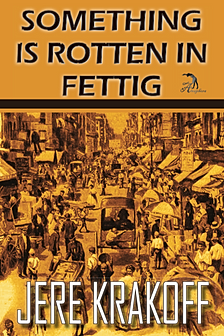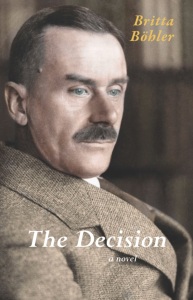 Salloum has excelled in evoking the Katrina disaster and in depicting a criminal sub-culture. The action keeps readers alert, and the New Orleans landmarks will interest those who lived or have visited that city. Candyland has been described as a “noir” suspense thriller, and it is that, but it is less pessimistic than Salloum’s earlier novel, Faulkner and Friends, and reaches a satisfying conclusion.
Salloum has excelled in evoking the Katrina disaster and in depicting a criminal sub-culture. The action keeps readers alert, and the New Orleans landmarks will interest those who lived or have visited that city. Candyland has been described as a “noir” suspense thriller, and it is that, but it is less pessimistic than Salloum’s earlier novel, Faulkner and Friends, and reaches a satisfying conclusion.
A review of Baggage by S.G. Redling
 Redling’s fast-paced novel is full of well-wrought scenes, including one in which Anna’s artist father finds her colouring an outline of a Cezanne that she saw at an art museum. He flies into a rage and destroys her prized book because she is colouring rather than creating.
Redling’s fast-paced novel is full of well-wrought scenes, including one in which Anna’s artist father finds her colouring an outline of a Cezanne that she saw at an art museum. He flies into a rage and destroys her prized book because she is colouring rather than creating.
A review Of The Arrangement By Ashley Warlick

A review of Something is Rotten in Fettig by Jere Krakow

A review of The Decision by Britta Bohler
 Britta Bohler has written a wonderful novel, an immersive and psychologically convincing account of Mann’s agony of decision. Smoothly translated by Jeannette K. Ringold, it is well researched and chock-full of sharp insights into one of the great writers of the twentieth century.
Britta Bohler has written a wonderful novel, an immersive and psychologically convincing account of Mann’s agony of decision. Smoothly translated by Jeannette K. Ringold, it is well researched and chock-full of sharp insights into one of the great writers of the twentieth century.
A review of Deliciously Ella Everyday by Ella Woodward
 Just reading the book is inspiring – with lots of tips for improving the diet and just having more fun with food, and every recipe I’ve tried has been a winner: easy, fast, using ingredients that are readily available (no obscure superfoods here) and reasonably priced.
Just reading the book is inspiring – with lots of tips for improving the diet and just having more fun with food, and every recipe I’ve tried has been a winner: easy, fast, using ingredients that are readily available (no obscure superfoods here) and reasonably priced.
A review of Dark Avenues by Ivan Bunin
 If you’re looking for a point of comparison, I’d say Bunin as a writer is similar to Chekhov, that’s his model. Though he is darker, more risqué and also narrower in his sympathies. There are some people, you feel, that Bunin is just not interested in – something you never feel with Chekhov. There are some people, you feel, that Bunin is just not interested in – something you never feel with Chekhov. Bunin is a little old-fashioned or out of touch too, you sense. Set in his ways. You read a story written in the ‘40s – and so contemporaneous with Hemingway, Waugh and Greene – and the people are behaving like turn of the century Russian nobility.
If you’re looking for a point of comparison, I’d say Bunin as a writer is similar to Chekhov, that’s his model. Though he is darker, more risqué and also narrower in his sympathies. There are some people, you feel, that Bunin is just not interested in – something you never feel with Chekhov. There are some people, you feel, that Bunin is just not interested in – something you never feel with Chekhov. Bunin is a little old-fashioned or out of touch too, you sense. Set in his ways. You read a story written in the ‘40s – and so contemporaneous with Hemingway, Waugh and Greene – and the people are behaving like turn of the century Russian nobility.
A review of West by Julia Franck
 West is part espionage thriller, part social realism (circa late ‘70s, early ‘80s) and probably partly autobiographical as well: as a young girl, Julia Franck crossed from East to West Germany with her family. The milieu of a reception centre in West Berlin has a banal horror to it, something akin to the quality of a (childhood) nightmare. Families share rooms with strangers and sleep in bunk beds.
West is part espionage thriller, part social realism (circa late ‘70s, early ‘80s) and probably partly autobiographical as well: as a young girl, Julia Franck crossed from East to West Germany with her family. The milieu of a reception centre in West Berlin has a banal horror to it, something akin to the quality of a (childhood) nightmare. Families share rooms with strangers and sleep in bunk beds.
An interview with Dawn Anahid Mackeen
 The author of The Hundred-Year Walk: An Armenian Odyssey talks about what compelled her to write her book, about her grandfather and the mandate his journals gave her, about the dangers and surprises of writing the book, about Raqqa, writing about genocide, about her own involvement and heritage, about her research and visiting Turkey, and lots more.
The author of The Hundred-Year Walk: An Armenian Odyssey talks about what compelled her to write her book, about her grandfather and the mandate his journals gave her, about the dangers and surprises of writing the book, about Raqqa, writing about genocide, about her own involvement and heritage, about her research and visiting Turkey, and lots more.
A review of Crochet Stitch Guide by Jean Leinhauser & Mary Ann Frits

Each of simple-to-follow, first-rate instructions is presented with a nice clear photograph of each of the various stitches detailed in the book. I particularly like the variety of stitches offered in 7 kinds of stitches including shells, textures, clusters, picots, V stitches, special stitches and miscellaneous.